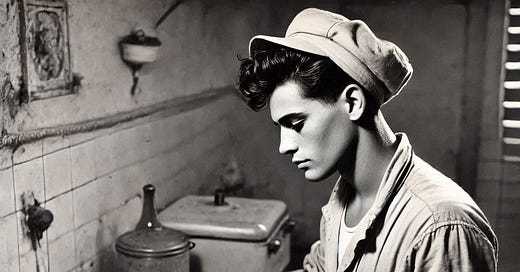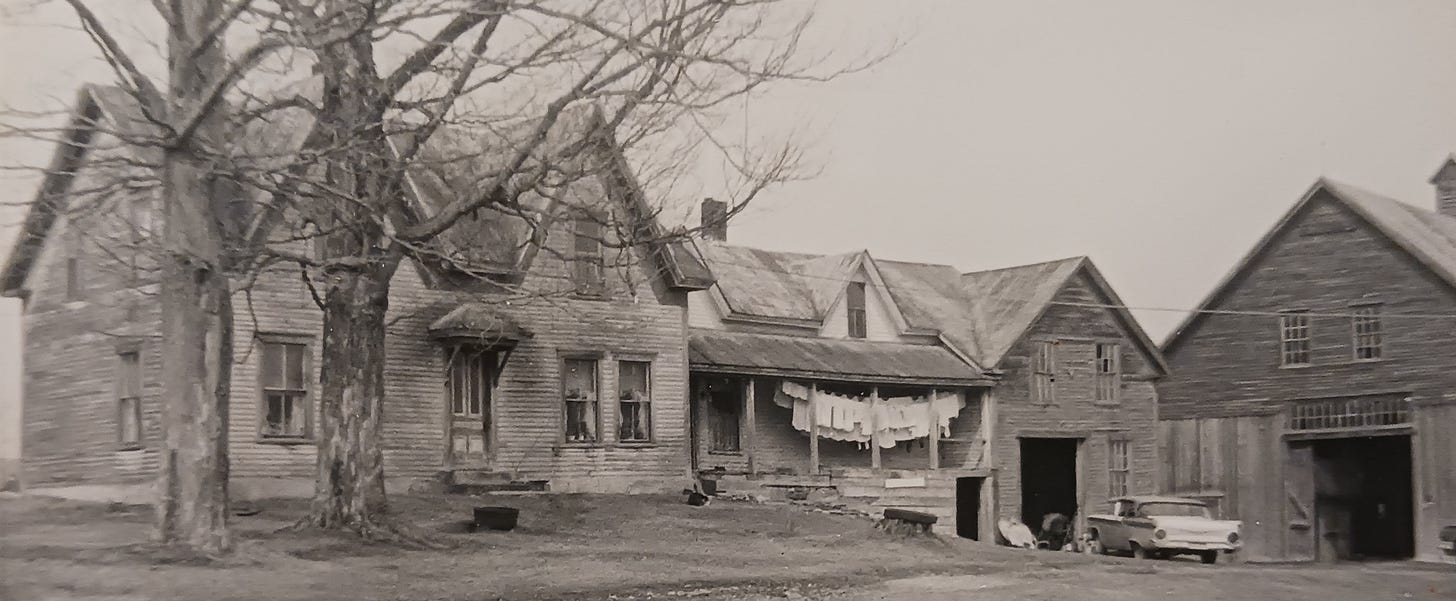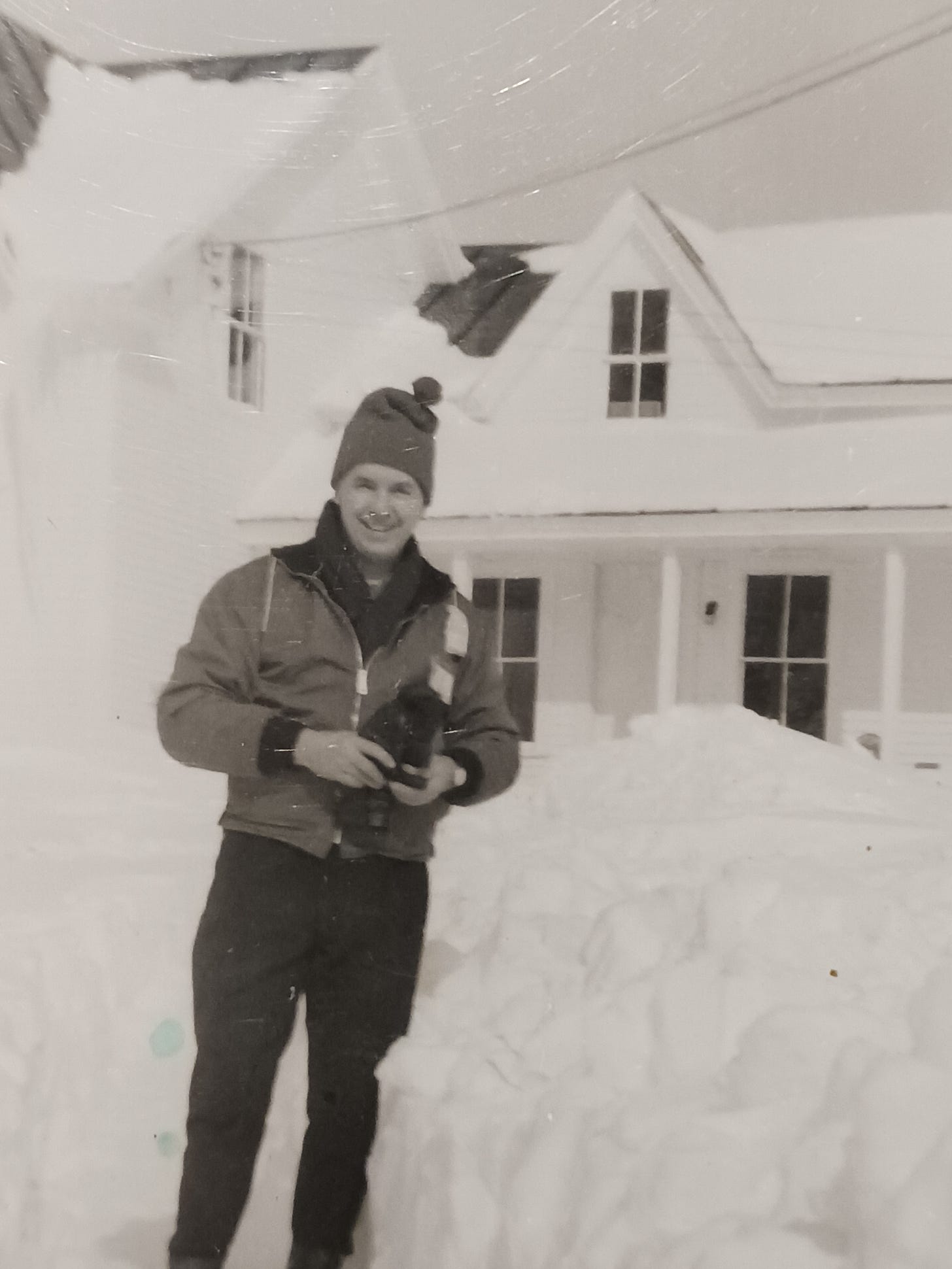The Revolutionary Friendship that Wasn't
The stranger who communicated better with my father than I could
A new installment of Hunted, an autobiographical account of God’s action in the life of a Vietnam War era radical activist. New to the series? This introduction provides context for the events described here. An index of other episodes, updated monthly, is also available.
A dilapidated rooming house full of transients was an odd place for a college student to live, but it was suited my new sense of myself. Finally and irrevocably, I had left the privilege of an upper middle class upbringing behind. The first new friend I made there, Mateo, a Puerto Rican factory worker, validated my conviction that a whole new life was beginning.
Mateo was lonely and poor. His expectations were modest. He needed someone to talk to. I, on the other hand, longed to show my comrades in PL, the revolutionary party I had recently joined, that I could recruit someone besides my own girlfriend. Looking down on the pair of us, God must have smiled at the futility of this project. My friendship with Mateo lasted only a few months, and its effect on my life was quite different from what I was hoping.
When we first met, Mateo pointed to himself and announced “puertorriqueño.” He spoke next to no English, and I only a few words of Spanish, but he was eager to tell me about himself and somehow we managed to make ourselves understood. Mateo had a wife on the island and a child on the way. He worked in a factory and saved most of his paycheck so he could send money. A perfect recruit, I thought, if only we could communicate a little more easily. Luckily the back pages of Challenge, the PL newspaper, were printed in Spanish, so I gave him a copy. Alas, no response. Was he really not interested? I tried to stay hopeful. Caleb, my PL mentor, kept urging us to get to know workers and make them part of our lives. Doing this with Mateo was no trouble at all.
Mateo was constantly scheming to save money so he could send more back to his wife. One evening he knocked on my door and announced that his friend, el mexicano, knew of a vacant two bedroom apartment nearby where we could both live for the price of a single room where we were now. What did I think about the two of us living there and each paying half? There was a radical idea! What better way to get to know someone than to share living quarters? I took Eileen over to see the apartment. It was a lot cleaner than the rooming house. She was thrilled not to have to run the gauntlet of drunks and ex-convicts to get to a bathroom.
Sharing rooms with a virtual stranger I could barely converse with was not without risk, but Mateo turned out to be an exemplary roommate. He didn’t drink. He didn’t have parties. He didn’t have friends over. My companionship with Eileen caused no problem at all. Mateo quickly learned our routine and we his. If Eileen and I fixed dinner there, Mateo would eat with us, then retreat to his room, leaving us to ourselves. Sometimes, when he worked third shift and had to be at the plant by 11, we’d give him a ride, dropping him off on our way to Eileen’s house, which we reached just in time for the curfew Ma had imposed.
Bruce, the local PL leader in Providence, knew all about Mateo and kept urging me to recruit him. The problem was, I had no idea how. Given the language barrier, explaining the Party and its revolutionary aspirations just wasn’t possible. The closest we came to real conversation was when he told me about his family back on the island, and when he taught me how to make fried plantains and shared some of his Café Bustelo.
Bruce, however, kept pushing. When a group of us planned to drive down to a regional PL meeting in New York, he urged us to bring Mateo along with us. Native Spanish speakers there could explain the movement to him better than we could. Kind of a far-fetched suggestion, I thought. Mateo would be bored out of his mind on the 4-hour drive and the day-long strategy meeting of an organization he had no part in. To my surprise, though, he said yes.
On a Friday night, the three of us crammed into the car with sleeping bags and shopping bags full of our clothes and followed Bruce and Emily out onto the highway. At first it felt like an adventure—a change of scenery and freedom from Ma for a few days. Within a few miles, though, the mood changed. Mateo reminded us it was hurricane season in the Caribbean. An enormous tropical storm had swept over Puerto Rico. Huge amounts of rain had fallen on his home town, and he hadn’t been able to reach his family by phone. He had no way to know what had happened to his wife, their baby, his mother and father, his brothers and sisters . . . . Mateo had a large family. This went on almost to the Connecticut border. We commiserated, but what else was there to say or do? There was no way we could possibly provide reassurance.
At last he stopped. We drove in silence for several minutes. Then he asked shyly if he could stand up at our meeting and tell people what was happening. Maybe he could pass around a bag and ask people to give money to send to his family.
Eileen and I glanced at each other in dismay. We couldn’t agree to that. How was I going to explain to Mateo that PL wouldn’t allow it?
At a rest stop, I checked with Bruce and Emily. Bruce agreed, but Emily had another suggestion. What if we gave Mateo some money ourselves? Maybe the people we stayed with tonight would chip in.
When we finally got to our destination, Bruce went in ahead of us. When the rest of us joined him, I counted nine of us standing there in the small living room. Our host handed Mateo an envelope. From its thickness, I guessed that everyone in the room had contributed. Mateo blinked back tears as he thanked us. Our small gesture meant as much as if we had let him pass a bag around the next day. That night made quite an impression on me. When I look back now on that weekend, I can recall nothing at all of what took place at the meeting, but Mateo’s huge grin when he opened that envelope is stamped boldly in memory. Though I believed at the time I was fully committed to PL and the communist movement, my thoughts and interests were already pointing in a different direction.
The New York trip didn’t trigger any new enthusiasm for revolution in Mateo. By now I’d given up on recruiting him, but he remained part of our lives. On the weekend after Thanksgiving, when my father invited Eileen and me to spend a few days in Maine with him, it seemed almost unthinkable to leave Mateo alone for the holiday and not bring him with us.
Several years earlier, my father had bought an old farmhouse near Sugarloaf Mountain to use as a ski lodge. In the late fall he drove up there to make sure the house was ready for winter. It had been more than a year since I accompanied him on one of these trips. He’d been furious when I dropped out of an Ivy League college and even angrier when he learned I was involved in radical politics. We’d clashed often and bitterly. After so much ill will, I wasn’t eager to drive all that way and spend a weekend with him in the middle of nowhere. Eileen, though, was curious about Maine, and even more curious about my father. After more thought, I decided the trip might be interesting. Meeting Eileen and Mateo would give him a glimpse of what my life was like now, and I looked forward to seeing how he would react.
I expected him to be ill at ease with the three of us and was surprised at his welcoming smile when he came out to greet us.
“Mateo, bienvenido!” he exclaimed when I introduced them.
Over drinks at the kitchen table, he told Mateo in halting Spanish about his childhood in Panama. His father, then an NCO in the Army, had been stationed in the Canal Zone. Though my father attended an American school there were plenty of local boys in the Zone and they used to play baseball and go swimming together. I knew about Panama, but it never occurred to me that my father learned to speak Spanish there, let alone hang around with the locals. It was pretty disconcerting hearing it now and realizing he communicated with Mateo better than I could.
The next morning I took Mateo and Eileen on a tour of the barn, milkhouse, and fields. This had been a working dairy farm when we bought it, but just barely. The owner had sold his cows, land, and house to pay off his debts. My father had had a lawyer write him a letter demanding he remove rusty equipment from the front yard. It was embarrassing to explain all this to Eileen and Mateo. I didn’t like people around me knowing about the privileged life I’d lived up until my late teens.
That night at dinner, my father described what the house had been like when we bought it and the work we’d done that first summer to make it livable. Mateo was interested, and I sensed he knew something about dirt cellar floors and tumble-down barns and old piles of dried-up manure. I had expected my father to look down on him and Eileen and them to take umbrage, but with his courtesy and good humor he seemed to have won them both over. The convivial atmosphere made me feel my father’s disappointment with me and our estrangement from one another all the more keenly.
It was a relief the next morning to say our good-byes and head back to Rhode Island. I was frustrated. My father had shown no sign of surprise or interest in the way my life had changed. He had pulled the wool over the eyes of Eileen and Mateo, giving them no glimpse of the harsh side of himself that I had experienced and that he had brought to bear on the destitute man we bought the house from.
Because of the language barrier, I couldn’t get into this in front of Mateo, but later when Eileen and I were alone, I tried. She wasn’t as receptive as I’d hoped. In her eyes my father didn’t speak or act like a rich man, and the house wasn’t anything like where a rich person would live. I tried to explain that wealth wasn’t the issue. It was the acquisitive, ambitious life my father had led, his insistence that I follow in his footsteps, and his utter disregard for the needs of the poor who were exploited by the capitalist system that he benefited from.
Eileen just shook her head.
“He was kind to me and Mateo. He was just being a good host.”
I gave up. I would just have to nurse my grievances in solitude. Through my friendship with Mateo, a seed had been planted, but several more years would pass before it bore fruit and my father and I were reconciled.
A few weeks after the visit to Maine, Mateo slipped out of my life as quickly and completely as he’d entered it just a few months before. I’d known he would go back to Puerto Rico one day, but I had no idea it would be at Christmas, when I drove up to my parents’ house in Boston for one more in a long series of stressful and acrimonious visits. When I came back he was gone.
The locks on the apartment had been changed. He was supposed to pay rent for that month, but he hadn’t. All of my clothes and kitchenware had been locked away in a closet. I had to plead with el mexicano to get them back for me, before moving on to the next grim furnished room in a ramshackle rooming house.
The hope of recruiting a Puerto Rican factory worker was gone forever, but Mateo did leave me with something more than just the large unpaid phone bill which must have precipitated his departure. Throughout our brief friendship, he was a witness to the human need and connection to family that I tried to reject in pursuit of my austere vision of justice.






